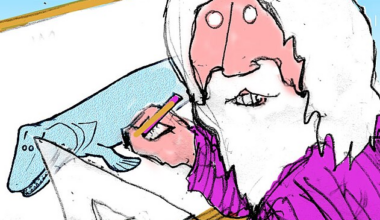Jihad by Word is a semi-regular series from Jalal Tagreeb in which he relates how, through being exposed to the flaws in Islamic apologetics during debates with nonbelievers, he left Islam and became a freethinker.
This final instalment is published on the author’s birthday as a gift to the secularists who helped him free himself from Islam—leading, in essence, to his rebirth as a freethinker. The introduction to and first instalment of the series can be found here and other instalments in the series can be found here.

One day in November 2023, some Muslim friends of mine from the Far East asked that I lead the group in the Maghrib prayer (one of the five mandatory daily prayers in Islam). Far Eastern Muslims value Arab Muslims as being linked to the birthplace of Islam, plus one of my ancestors was a famous companion of the Prophet Muhammad. I tried to make excuses to get out of it, but they insisted, so I went ahead and led the prayer. Little did my friends know that by that time I was an ex-Muslim. After my defeats by secularists in numerous debates, I had turned my back on Islam. They were being led in prayer by an apostate who had devoted himself to refuting and defeating Islam!
When I returned home, I apologised to Satan (known as Iblis in Islam) for obeying Allah’s will, but he told me: ‘Do not worry, my friend, I will not punish you by putting you in hell forever, I am not Allah! It suffices to do your freethinker homework.’ I could not resist thanking the almighty Satan and I obeyed His command. That night, I did my homework, studying with secularists all the flaws in Islamic apologetics.
In his book, Allah tells Satan: ‘[Y]ou will certainly have no authority over My servants, except the deviant who follow you’. (Quran 15:42.) Allah seems to have control over some servants, but not over everyone. At least Satan does not make claims that He cannot fulfil…
Of course, I don’t mean that I believe in Satan/Iblis literally. But the disobedient Satan figure is a potent symbol for me, epitomising my own journey away from prostration to Allah towards freedom and independence.
Muslim scholars and apologists claim that during Ramadan, all the devils are chained. Yet I and other freethinkers have joyfully engaged in counter-apologetics during the last two Ramadans. We served Satan during the holiest Muslim month, so it would seem that Satan is not chained after all. Subhan Iblis! He is the greatest, indeed. And He never called us ‘servants’.
The Satan of Islamic theology is not just a personal symbol. He is a paradoxical figure who highlights the inconsistencies and contradictions inherent in religious belief. Satan was a key aspect of my journey away from faith. The story of Satan’s refusal to bow to Adam, as described in the Quran, raises profound questions about the nature of God’s commands and Satan’s role in the narrative. Satan, created from fire, refused to prostrate before Adam, who was made from clay, arguing that He was superior. This act of defiance resulted in His expulsion from Paradise.
Yet, one might ask: Why did Allah create something that could argue with him and cause trouble in the first place? Satan’s refusal can be seen as an act of courage. Ironically, it is also consistent with the divine command to worship none but Allah: if all creatures are to bow only to Allah, then Satan’s refusal to bow to Adam could be interpreted as an act of fidelity to this principle, albeit one that defies Allah’s direct command.
Moreover, the Quran verse cited above suggests a limit to Allah’s power: Satan is granted authority over some of humanity. This raises further questions about the nature of divine power and the existence of free will. If Allah is truly omnipotent, why grant Satan any power at all?
The paradoxical nature of Satan’s role, combined with the theological inconsistencies surrounding his creation and actions, challenges the coherence of Islam’s theistic belief system. The Quranic narrative reveals contradictions in the divine attributes of omnipotence and omnibenevolence and highlights the problematic nature of theological doctrines that fail to align with observable reality.
This was just one of the many Satanic verses I encountered which shook my faith in Allah. Satan, paradoxically, led me to nonbelief. As for the existence of Allah more generally, I recommend Edgar Morina’s book Disproving Islam, which provides many excellent scientific arguments against the existence of Allah.
My complete loss of faith was not an overnight event but a gradual process of disillusionment. It involved countless hours of introspection, reading, and engagement with ideas that I had previously dismissed. Even as I continued to defend Islam in debates with secularists, I began to feel empty inside. I was like a hot air balloon: I seemed big and confident, but I was easily popped. This made it look to my opponents as if I just suddenly crashed out of Islam, but the truth is more complex.
The final admission of my defeat was both liberating and deeply humbling. It was an acknowledgement of my intellectual defeat and a surrender to the reality I had long resisted. It was a decisive defeat of Jihad by Word. Nowadays, with digital tools allowing people to document and share information efficiently and systematically, Islam simply cannot keep up. There can be no more tricks. Everything is well documented. Though the defeat of Islam will take time to fully play out, secularists have essentially already won. They have returned the Muslim genie to the bottle and locked it there forever. How long it takes Muslims to realise their intellectual defeat is, however, another matter entirely.
Jalal’s ‘statement of defeat’ by secularists in debate can be found here.
Related reading
The need to rekindle irreverence for Islam in Muslim thought, by Kunwar Khuldune Shahid
The price of criticising Islam in northern Nigeria: imprisonment or death, by Emma Park
My journey from blindness to rationality: how English literature saved me, by Sonia Nigar
Rushdie’s victory, by Daniel James Sharp
Surviving Ramadan: An ex-Muslim’s journey in Pakistan’s religious landscape, by Azad
From religious orthodoxy to free thought, by Tehreem Azeem
Breaking the silence: Pakistani ex-Muslims find a voice on social media, by Tehreem Azeem
Britain’s liberal imam: Interview with Taj Hargey, by Emma Park
The Satanic Verses; free speech in the Freethinker, by Emma Park
How I lost my religious belief: A personal story from Nigeria, by Suyum Audu
Why I am no longer a Hindu, by Amrita Ghosh








Your email address will not be published. Comments are subject to our Community Guidelines. Required fields are marked *
Donate